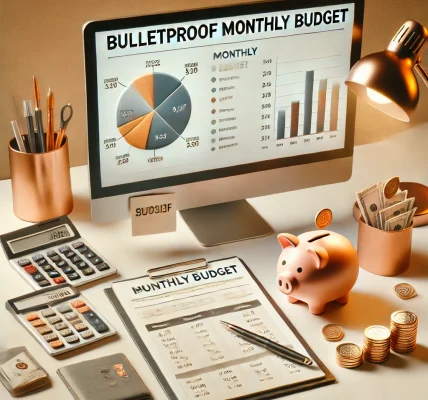When it comes to maintaining a healthy financial life, reviewing your budget regularly is essential. A monthly budget review offers a snapshot of your financial situation, highlights areas for improvement, and ensures you’re staying on track with your financial goals. If you’re serious about sticking to a budget and building long-term wealth, setting aside time each month for a detailed budget review can make all the difference.
In this blog post, we’ll explore the benefits of monthly budget reviews and walk you through the process of how to do them effectively. Whether you’re new to budgeting or looking for ways to fine-tune your financial management, this guide will help you stay on top of your money.
Why Monthly Budget Reviews Are Important
Budgeting is not a one-time task; it’s an ongoing process. While creating a budget is the first step toward managing your finances, the real power lies in regularly reviewing and adjusting it. Here’s why monthly budget reviews are crucial:
1. Stay on Track with Financial Goals
Reviewing your budget monthly helps you stay focused on your financial goals. Whether you’re saving for an emergency fund, paying off debt, or investing for the future, consistent budget reviews allow you to track progress and make necessary adjustments. It ensures that you’re allocating enough resources toward your goals and that you’re not veering off course due to overspending.
2. Identify and Eliminate Wasteful Spending
A monthly budget review provides an opportunity to analyze your expenses and identify areas where you may be overspending. Perhaps you’re spending more on dining out or subscriptions than you realized. By reviewing your spending habits, you can cut back on non-essential expenses and redirect that money toward savings or investments.
3. Improve Financial Awareness
Many people are unaware of where their money is actually going until they track it. A monthly budget review enhances your financial awareness, giving you a clear picture of your income, expenses, and overall financial health. This insight is empowering, as it helps you make informed decisions about your finances and avoid unnecessary stress.
4. Adjust for Life Changes
Your financial situation and needs are constantly changing. Whether it’s a change in income, new expenses, or shifts in your financial goals, a monthly budget review allows you to adjust your budget to reflect these changes. This ensures that your budget is always aligned with your current financial circumstances, so you’re not caught off guard by unexpected costs.
How to Conduct a Monthly Budget Review
Now that you understand the importance of monthly budget reviews, let’s dive into how you can do them effectively. Follow these steps to ensure your budget stays on track:
1. Gather All Your Financial Documents
Before you begin, gather all the necessary financial documents, including bank statements, credit card statements, receipts, and any other records of your income and expenses. This will give you a clear overview of your financial activity for the month.
2. Compare Your Actual Spending to Your Budgeted Amounts
Look at your budgeted amounts for each category (such as groceries, entertainment, and transportation) and compare them to the actual amounts spent. Are there any categories where you’ve exceeded your budget? If so, analyze why this happened and whether it was necessary.
Tip: If you’ve spent more than expected in one area, try to balance it out by cutting back in another category. For example, if you’ve spent more on groceries, reduce your entertainment expenses for the next month.
3. Assess Your Income and Savings
Next, review your income for the month. Did you meet your expected income? Have you managed to save as much as you planned? Make sure that your savings goals are still a priority and that you’re contributing enough to your emergency fund or retirement accounts. If not, consider adjusting your spending habits in the upcoming month to reach your savings targets.
4. Evaluate Your Debt Repayment Progress
If you’re working on paying off debt, take time to review your debt balances and repayment progress. Did you make the planned payments? Are you on track to pay off your debt within the timeline you’ve set? If you’re struggling with making debt payments, consider revising your budget to allocate more funds toward paying down high-interest debt.
5. Adjust for Future Expenses
There may be upcoming expenses that weren’t accounted for in your previous budget, such as a birthday gift, car maintenance, or a planned vacation. Add these anticipated expenses into your next month’s budget to avoid any surprises. Planning for future costs in advance helps prevent budget-related stress later.
Best Practices for Monthly Budget Reviews
Here are some additional tips to make your monthly budget reviews more effective:
1. Set a Regular Review Time
Make your monthly budget review a routine by setting a regular time each month to conduct it. You can schedule it at the same time every month—perhaps at the beginning or end of the month—so it becomes a habit.
2. Use Budgeting Tools and Apps
Take advantage of budgeting tools and apps that can make your review process easier. Apps like Mint, YNAB (You Need A Budget), and PocketGuard can automatically track your income and expenses, categorizing them for you. These tools can save you time and help you spot trends or issues quickly.
3. Celebrate Successes
Don’t forget to celebrate your financial wins. If you’ve stuck to your budget or paid off debt, give yourself credit for your hard work. Positive reinforcement will keep you motivated to stay on track.
4. Keep Your Budget Flexible
Remember that your budget is a living document, not a rigid plan. Life is unpredictable, so allow room for adjustments. If you find that one category consistently needs more money, consider tweaking your budget to better reflect your needs.
Final Thoughts: Make Budget Reviews a Habit for Financial Success
Monthly budget reviews are an essential tool for achieving long-term financial success. They help you stay aligned with your financial goals, track spending, and make necessary adjustments. By regularly reviewing your budget, you’ll gain better control of your finances and feel more confident about your ability to achieve financial freedom.




